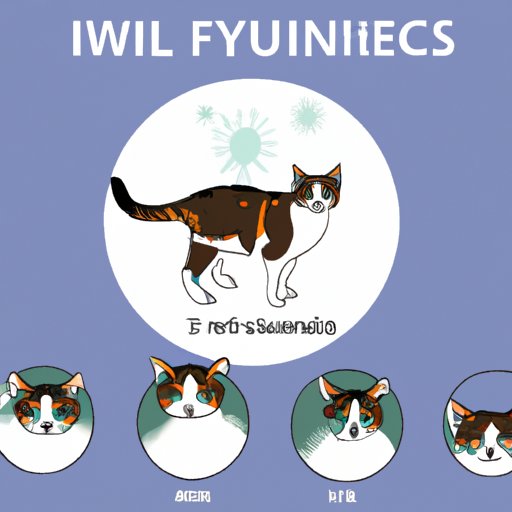Introduction
Have you ever heard of FIV in cats but weren’t quite sure what it was? FIV, or Feline Immunodeficiency Virus, is a viral infection that affects cats worldwide. Understanding this issue is important, especially for those who own or are considering adopting a cat. This article aims to provide a comprehensive guide to understanding FIV in cats and debunking common myths surrounding the infection.
A Comprehensive Guide to Understanding FIV in Cats: Symptoms, Treatment and Prevention
First, let’s define FIV. It is a virus that weakens a cat’s immune system and is spread through bites from infected cats. While it is similar to HIV in humans, it cannot be transmitted to humans or other animals.
The signs and symptoms of FIV in cats may not be immediately apparent, but common symptoms include weight loss, fever, loss of appetite, and recurring infections. Prompt diagnosis of FIV is important, as it can lead to severe health complications in cats if left untreated. Veterinarians can diagnose FIV through blood tests and clinical examinations.
While there is currently no cure for FIV, treatment options for infected cats can help manage the virus and its symptoms. This includes antiviral medications, nutritional supplements, and frequent check-ups with a veterinarian. Prevention methods include spaying and neutering cats, keeping cats indoors, and avoiding contact with infected cats.
Early detection of FIV is crucial in minimizing the virus’s impact on a cat’s health. Regular check-ups and blood tests can help catch FIV early on and prevent the virus from progressing.
The Reality of Owning an FIV Positive Cat: Things to Consider Before Bringing One Home
If you are considering bringing an FIV-positive cat into your home, there are several factors to consider. Caring for an FIV-positive cat involves providing quality nutrition, regular veterinary check-ups, and managing their living environment to minimize stressors that could impact their weak immune system.
While FIV-positive cats can live for many years, they may have a shorter lifespan and experience more health complications. This can result in additional veterinary costs and medical treatments. Multi-cat households that include FIV-positive cats require additional management and supervision to avoid transmitting the virus to other cats.
Adopting FIV-positive cats from shelters is an excellent way to help these cats find homes and receive the necessary care and support. However, it is critical to remember that owning an FIV-positive cat is a significant responsibility that requires additional care and attention.
Debunking Myths About FIV: Separating Fact from Fiction
Unfortunately, there are many misconceptions about FIV that often lead to discrimination against infected cats. It is crucial to separate fact from fiction and understand that FIV-positive cats can lead happy, healthy lives.
One common myth is that FIV is highly contagious and easily spreads between cats. However, the virus is only spread through deep bite wounds and not through casual contact or sharing food and water bowls. Spaying and neutering infected cats can also help reduce the virus’s spread since hormones can increase fighting behaviors that lead to bites.
Another myth surrounding FIV is that infected cats are unadoptable and should be euthanized. However, FIV-positive cats can live long, healthy lives and be wonderful companions. It is essential to consider the individual cat’s health and temperament when making adoption decisions, rather than solely focusing on their FIV status.
FIV and Feline Behavior: How the Diagnosis Affects a Cat’s Personality and Habits
While FIV mainly affects the cat’s immune system, it can also impact their behavior and mental health. FIV-positive cats may experience depression, anxiety, and changes in their personality. Additionally, they may engage in behaviors like spraying or aggression, often due to stressors in their environment. Providing a low-stress environment, nutritional support, and mental enrichment can help alleviate these symptoms and improve their overall well-being.
It is also essential to ensure FIV-positive cats receive good nutrition. High-quality, nutritious foods can help boost their immune system and overall health.
FIV as a Global Issue: Exploring the Prevalence and Impact of FIV on the World’s Cat Population
FIV is a widespread issue in cats worldwide, with an estimated 2.5% of cats infected. The virus primarily impacts stray and feral cat populations, where transmission rates are highest due to fights over resources and mating behaviors. FIV has heavily impacted these populations, leading to high rates of illness and death.
It is critical to raise awareness about FIV and its impact on cats worldwide. Several organizations and initiatives are devoted to providing care for FIV-positive cats, from educating the public to advocating for policy changes to help prevent the virus’s spread. Governments and the public alike play a crucial role in addressing FIV and its impact.
Conclusion
FIV in cats is a complex issue that requires a thorough understanding to make informed decisions. This article has provided a comprehensive guide to understanding FIV in cats, including its symptoms, treatment, and prevention. It has also explored the realities of owning an FIV-positive cat, debunking myths surrounding the infection, and considering its impact on a cat’s behavior, health, and lifespan. Finally, this article has stressed the importance of raising awareness about FIV as a global issue and taking action to help prevent its spread. With the proper care and attention, FIV-positive cats can live long, happy, and healthy lives.
